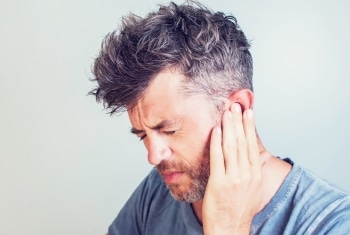
Understanding Tinnitus
Tinnitus is a symptom of an underlying condition that manifests as noise in the ears.The noise can be temporary or permanent, and it may sound different to different people. Our Boulder patients have described their tinnitus as a:
- Musical note
- Whistle
- Roar
- Ring
- Click
- Hiss
Regardless of the sound’s frequency or pitch, it’s important to seek relief if you find the noise affecting your ability to concentrate, hear or sleep. Even infrequent occurrences can interfere with your work, social life and day-to-day activities. According to the American Tinnitus Association, more than 50 million Americans suffer from tinnitus, yet few ask a medical professional about treatment options. Common conditions that cause tinnitus include:
- TMJ/TMD
- Age-related hearing loss
- Noise-induced hearing loss
- Middle ear obstructions
- Head or neck trauma
- Barometric trauma
- Sinus pressure
- Traumatic brain injury
- Ototoxic drugs
TMJ &Tinnitus
Hearing loss is often the cause of tinnitus, but many TMJ sufferers also suffer from tinnitus. TMJ causes what is known as peripheral tinnitus, meaning the cause is located elsewhere in your body (or in the periphery of your nervous system). TMJ-induced tinnitus occurs when the muscles connecting to your ears are negatively affected by the movements and pressure of a misaligned jaw.
Neuromuscular Dentistry for Tinnitus Relief
While a visit to your general practitioner is often a good starting point if you’re experiencing ringing in your ears, a neuromuscular dentist can help determine if your tinnitus is caused by TMJ. Neuromuscular dentists specialize in the relationship between your teeth, jaw and surrounding muscles; they will work with you to realign your jaw and address any underlying conditions affecting its movement.
To determine if you have TMJ-induced tinnitus, Dr. Adler will perform a K7 evaluation that uses electromyography and joint sonography to gather detailed information about the function of your jaw. He may also order a 3D-scan of your head, which will show the position of your jaw from all angles. Based on your results, Dr. Adler will develop an individualized treatment plan that may include one or more of the following:
- Physical therapy
- Trigger point injection therapy
- Transcutaneous electrical nerve stimulation/TENS therapy
- A fixed or removable orthodontic device
- Regular orthodontic adjustments, typically every 7 to 14 days
If muscle functions in your face or tongue are affecting your jaw movements, Dr. Adler may also suggest myofunctional therapy.
Once your proper bite alignment has been restored and your pain has decreased, you will move on to the second phase of TMJ and tinnitus treatment. During this stage, Dr. Adler will work to permanently restore your jaw to its natural resting position. He may recommend neuromuscular orthodontics or full mouth reconstruction depending on the severity of your condition.
Neuromuscular Dentistry in Boulder
Dr. Adler is an experienced neuromuscular dentist, serving patients in Boulder and surrounding areas of Colorado, including Longmont, Loveland and Fort Collins. If you’re experiencing symptoms of TMJ or believe you have TMJ-induced tinnitus, call 303-449-1119 to schedule a free consultation.

